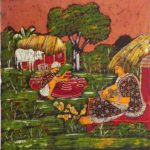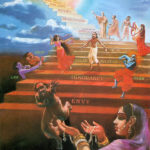In times of great trial, it becomes difficult for individuals to accept or even comprehend great tragedies that may befall them, their loved ones, or their societies. Calamaties undoubtedly cause sensory overload leading to tragic hysteria and frantic calls for answers. Indeed, questions such as “what is the point of it all?”, “what is the meaning of all life?”, and “why do bad things happen to good people?” are frequently asked, occasionally even demanded, sometimes hatefully. But this despair and even anger are all understandable, particularly when people themselves have not been told why. So let us take these questions one by one:
First, “what is the point of it all?” For those individuals raised in the dharmic tradition, or more specifically, raised with proper dharmic culture and education, the answer is easy (though not always easily understood). The point of it all is that life is merely a lesser reality. When we play a video game or enter into a simulation, it is all an illusion, but feels very real, sometimes all too real. The bonds of attachment that bind us to others give birth to some of the most beautiful feelings and relationships in all of creation: Mother and Son, Father and Daughter. Husband and Wife. Friend and Friend.
When the sanctity of these relationships, especially the first two, are systematically and methodically degraded, what else can be expected but catastrophe?
When people do not take care of their health and live fast lives for fast times, what else can be expected but tragedy?
When people live for themselves or their own needs, and can’t think about others, what else can be expected but despondency? It is only when begin to put ourselves in the shoes of others that we begin to understand ethics. It is only when we consider the feeling of others, that we begin to understand Dharma. It is only when we begin to understand the need for a fair game, that we being to understand the rules of the game.
Whether it is team sports like water polo or MMORPG like World of Warcraft, the game is only fun when people play together and work together. The game is the most fun, for the most people, when people don’t cheat. It’s not that cheating on your partner can’t lead to personal physical pleasure, it’s that cheating on your partner will lead to pain for others..and in the end, pain for yourself. Gyaanis may ask, “if it is all maya, then who cares?”. But then if it is all maya, why do you gyaanis whine about pain? Accept pain the same way you should then accept pleasure…with equanimity and detachment (vairagya). The questions about what is and isn’t Maya often plague us, and even lead to questions about responsibility? After all, how could there be responsibility in illusion?
Second, the meaning or purpose of life. What is the meaning of life? It is to perfect ourselves, ethically, morally, dharmically. Life is indeed an illusion, a lesser reality, a video game, if you will, but it is one that, like a simulation, feels exceedingly real. When we gratify the senses, we feel pleasure. When we are pinched, we feel pain. When we lose or experience loss, we feel sadness or heartbreak.
Some may ask then, why is there such suffering this world? But the one they forget to ask is, why do people do so much wrong in this world? Just as traditional parents slap the incorrigible child who does something wrong (after repeated warnings), so too does God (or Nature, or the Universe, or whatever power in existence you believe in) punish us, when we incorrigibly commit wrong. “What wrong did I do?”, you may ask. But the question is also, “What right did you do?”. If you spend all day, 24×7, outraging about how bad things are and whining about how people don’t care, then proceed to retweet pictures of Marilyn Monroe from the 1960s, instead of looking for useful information to disseminate…what do you expect? What else can shake you out of your pathetic mentality of say one thing and do another? What else would happen when you betray your own common cause for personal gain, despite paying lip-service to dharma?
But why feel the pain? It’s because if we didn’t have skin in the game, if we didn’t have something to lose, how could it be determined who we really are? Anybody can be generous when they are rich…but what are they willing to sacrifice, or for whom are they willing to sacrifice when they are poor? Anyone can be your spouse when you have money. Will they be your spouse when you don’t? Anyone can love you when you have looks. Will they love when you haven’t? (we all grow old, so don’t kid yourselves, lotharios and beauty queens). It is because we have skin in the game, that our true nature is ultimately determined and proven. Do we just call it quits when we are knocked down, or do we get back up and finish the task we set out to accomplish.
Naturally, people also call for compassion (Karuna). When there is excessive Karuna, we forget that the coach’s job is not to be our friend, and that the referee’s job is not to bend the rules for our benefit. That is why moha is decried. It is not because feelings don’t matter. It is not because love doesn’t matter. It is merely that Prema isn’t Moha. If your captain tells you to pass, but you’re too selfish and want to score the goal, what can you expect? If your coach tells you to stick to the playbook, but you want to follow your own inclination, what can you expect? If your referee warns you about playing by the rules, but you still engage in unsportsmanlike behaviour, what can you expect? Team tension, getting thrown out of the game, getting suspended for the year. So things are in the game of football & soccer, so it is in the game of life. If you can’t see beyond your own nose, don’t expect to be an all-star player (who sees several moves ahead through training and practice).
Third, “why do bad things happen to good people?”…and presumably its corollary “why do good things happen to bad people”. If crime didn’t pay, people would never do it. After all, criminals make money, sociopaths achieve agendas, and psychopaths feel pleasure. The point is not that crime never pays, it’s just that it pays upfront, but saddles with a crushing, multi-birth debt, sometimes with terrible interest payments. Relatively minor infractions also add up. Seemingly legal immoralities, also add up. As we have written before, it is not great evil that causes great evil, but lesser evils that add up creating the great evil. Societies that undergo great tragedies should not merely curse the stars.
Did our society stray from its proper path? Did individuals break the rules of the game? Did our janata forget its Dharma? That is the purpose of Dharma. Dharma represents the Guidelines of the game, the Rules of the Game. Some may ask, “well, if life is just a game, why can’t I just play the game the way I want, do what (or whom) I want to do, love what or whom I want to love?” But if people, most people, or even all people don’t observe the rules what happens?—Big fish eats little fish, a.k.a Matsya Nyaya. Ravanas steal the wives of others, Duryodhanas take the kingdoms of others, and Shakunis ruin the lives of others. That is why Dharma exists. Now those are the easy examples, what of the lesser ones?
Blatant evil committed by evil people is obvious to identify. In fact, the reality is, however twisted the nature of the villain, he (or she…sorry ladies, gender equality applies here too) merely brings out our true nature or hidden desire. It’s when we come face to face with one that our true character is revealed. That is the difference between a Sita who remained faithful to her husband and the countless other married women who lusted after Ravana. That is the difference between a Bharata, who rejected his elder brother’s kingdom, and a Duryodhana who took it. And that is the difference between a Shakuni who burned for revenge for what was done to him, and a Charudatta who quietly accepted the vicissitudes of life with moral courage.
That is why blind ritualism is criticised, not because rituals don’t matter (they do), but because principles come before rituals. That is why it is character that makes a Brahmin, principles that make a Brahmin, morals that make a Brahmin, and not rituals/learning (which are merely an aid and an ornament). After all, what is the point of a chaturvedi who switches sides and helps the invader? That is why we revile traitors like Murari Rao and praise the martyr Priests of Somnath who fought, not just for the Temple, but for their principles.
If life is in fact a game, then sometimes people get pulled out of the game by the referee. And if the team itself isn’t observing the rules, the coach will bench many of them, and put in second-stringers. When the attitude of the wrongdoing but sanctimonious causes them to ask the enemy to attack his former king who punished him for the wrong he did…what else can wake such a population up?
It is often said that a fool is a fool, so what can be expected of him? But at least the fool responds to punishment and corrects himself, what do you do with a knave? That is why there is catastrophe (vyasana). Catastrophe gives wake up calls to societies who not only do not observe the rules of the game, not only don’t want to hear the rules of the game, but actively seeks to stymie or even harm those who remind them of the rules of the game.
Still others of course suffer due to the effects of their prarabdha karma (the karma they are destined to experience in this life due to past wrongs). True, it is horrible to lose a loved one. The very thought of a mother can bring a tear to the eye of the Indian son (much to the perennial annoyance of the Indian daughter-in-law), so what of the tragic loss of one? But the best balm in such terrible tragedies is to recognise that rather than feel depression for those who passed (especially quickly), it is better to take heart in the fact that they may not have to suffer evil days ahead. Indeed, for those of us who have ever seen a grandparent or an uncle suffer from rheumatism or cancer, the initial loss is usually balanced by recognising that their leaving this life brought an end to their suffering. They may be out of the game, but the love is still there. The familial love, Vatsalyam, remains. They may be out of the game but they are still cheering for us from the sidelines. Reunions will occur, not in this world, but the next.
For those of us who are still in the game, however, the job is not over. After a tough loss, team captains and assistant captains must be there for their teammates. If you haven’t suffered from injury, think of those who have. If you have suffered from injury, think of those who have suffered worse. Don’t give in to your inner demons. Don’t give up your destiny for perfection. If life is indeed a game, play it.
So after mourning for a respectable period of time, after honouring the life of our loved ones, after deciding to cherish their memory and remember the good times, after completing the proper rituals that confirm that Vatsalyam and bring the departed the familial comfort they in turn seek for us, we must pick ourselves up, and get back into the game.
Asato ma sat gamaya
Tamaso ma jyothir gamaya
Mrthyor ma Amrutham gamaya
Aum Shanthi, Shanthi, Shanthihi
May life lead us from the Unreal to the Real
From Darkness onto Light
From Death to Immortality
Aum Peace, Peace, Peace.



